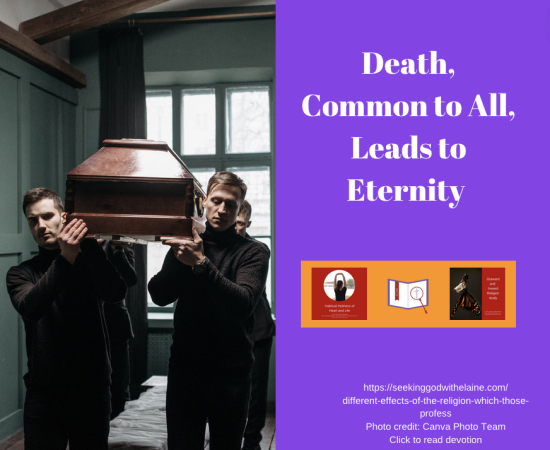We all are going to experience death, and we all are going to experience eternity. This devotional reading looks at how our actions dictate where we spend eternity.
Nuggets
- To spend eternity with God, we have to be blameless.
- Goats appreciate the actions, not the commandment to love God above everything else.

What Boston said in this point of his sermon interested me. He wrote, “In the different passage which those have out of time into eternity. Death is the point at which we all meet; but it is the point where outside and inside Christians part forever (Psalm 37:37, 38).”
Resource
In today’s vernacular, we would say that death is an equalizer. All will die one day. This is a result of sin.
But then comes eternity. All will experience eternity, but there will be a huge separation that occurs when judgment is passed.
The sheep will be separated from the goats. Goats aren’t going to like how they spend their eternity.
Glossary
Let's Put It into Context
To read devotions in the Habitual Holiness of Heart and Life theme, click the button below.
Here is a running list of nuggets for the theme.
Devotions in the Outward and Inward Religion study
Here is a running list of nuggets for the study.
We are using Boston’s sermon as the foundation for this series.
Resource
Sheep Are Blameless
“Mark the blameless and behold the upright, for there is a future for the man of peace. But transgressors shall be altogether destroyed; the future of the wicked shall be cut off” (Ps. 37: 37-38 ESV)
To spend eternity with God, we have to be blameless.
When we read Psalm 37: 37-38, we question how anyone can be blameless. We think that means we have to have 100% of the desirable characteristics as good all the time.
True, blameless means free from sin and impurity.
But thinking we won’t sin anymore isn’t correct. No one can be 100% sinless — only Jesus because He was God’s Son.
Instead, it is a growing process, as we said in the last two devotions. We have to be growing in knowledge and grace (II Pet. 3: 18 ESV).
The problem is that there is no guarantee for growth — even for those who have accepted Jesus as our Savior.
Evans has helped us understand that. He wrote, “True, there is the seed of all grace in the heart of every child of God, and it is an incorruptible seed, but it has to grow, and this takes long time, and, meanwhile, imperfection is often and sadly manifest.”
Resource
Let’s think that through. We are given grace when we accept the Plan of Salvation.
Grace is a free and unmerited gift of love from the Heavenly Father, given through His Son, Jesus Christ, that enables salvation and spiritual healing to believers by the work of the Holy Spirit.
Salvation is the gift of life through the deliverance from condemnation and sin to acceptance and holiness and changes us from being spiritually dead to spiritually alive.
- Sin is not believing that Jesus is our Savior to save us from our actions by humans that disobey God and break one of His reasonable, holy, and righteous laws and commandments, goes against a purpose He has for us, or follows Satan’s promptings.
- Holy means to be set apart — because of our devotion to God — to become perfect, and morally pure while possessing all virtues and to serve and worship God.
- Perfection means we reach a state of maturity because the combination of the spiritual graces form, when all are present, spiritual wholeness or completeness — holy, sanctified, and righteous.
- Spiritual graces are worldly morals that have been submitted to God to further His kingdom instead of enhancing this world.
- Sanctified means to be set free from sin.
- Righteous means we are free from sin because we are following God’s moral laws.
- Pure means not being sinful or having the stain of sin.
- Virtues are standards of moral excellence.
- Perfection means we reach a state of maturity because the combination of the spiritual graces form, when all are present, spiritual wholeness or completeness — holy, sanctified, and righteous.
- Holiness is the transcendent excellence of His nature that includes elements of purity, dedication, and commitment that lead to being set apart.
- Purity means possessing God’s moral character, having eliminated the stain of sin.
- Spiritual death is the spiritual separation from God that occurred as a consequence of Adam and Eve’s original sin.
- The spiritually alive are those who have ABCDed, so they are no longer separated from God.
- Holy means to be set apart — because of our devotion to God — to become perfect, and morally pure while possessing all virtues and to serve and worship God.
Glossary
The ABCDs of Salvation
If you have not become a believer in Christ, please read through the
Plan of Salvation and prayerfully consider what God is asking you to do.
A – admit our sins
B – believe His Son Jesus is our Redeemer
C – confess God as Sovereign Lord
D – demonstrate that commitment by making any changes needed in our lives to live the way in which God has called us
The Disciple’s Job Description
When we make a genuine profession of faith, we can never lose our salvation. “I give them eternal life, and they will never perish, and no one will snatch them out of my hand. My Father, who has given them to me, is greater than all, and no one is able to snatch them out of the Father’s hand” (Jn. 10: 28-29 ESV).
The key word is genuine. If we do not make a genuine profession of faith, we can lose our salvation.
It isn’t going to be easy. Evans said that it takes long time, and we usually fail.
How do we make it genuine? We grow closer to God. We love God, not the idea or principle of God.

Goats Love the Principle of God
“Then they also will answer, saying, ‘Lord, when did we see you hungry or thirsty or a stranger or naked or sick or in prison, and did not minister to you?’” (Mt. 25: 44 ESV)
Goats appreciate the actions, not the commandment to love God above everything else.
Wasn’t that what the goats did? They didn’t love God. They loved the principle of God, not Him.
They love — if they believe there is a God — that God is love. They love that we can be good people and do random acts of kindness for others.
They think that should be enough.
They just blow by the fact that we have to submit to Jesus as Savior and Redeemer.
Yes, we do need to be redeemed. No, we can’t do it ourselves.
Everyone is going to be judged. Yes and no will be the only options available.
Do we have a personal, growing relationship with Jesus or don’t we?
The goats think they have done enough for admission to Heaven, just as the Matthew 7: 21 people do. Both find out they are wrong.
But if we look at this passage in Matthew more closely, we see both the sheep and the goats are surprised.
“Then the righteous will answer him, saying, ‘Lord, when did we see you hungry and feed you, or thirsty and give you drink? And when did we see you a stranger and welcome you, or naked and clothe you? And when did we see you sick or in prison and visit you?’” (Mt. 25: 37-39 ESV).
The righteous were doing deeds because Jesus told them to do so. They were checking off a box.
They weren’t doing the good deeds because that is to be our nature.
The goats were doing good deeds to get recognition.
We can’t tell them apart.
That isn’t good. Jesus told us we should be different from the worldview people. “By this all people will know that you are my disciples, if you have love for one another” (Jn. 13: 35 ESV).
Gray reminded us that the separation will be based on character. No, not that we have the character of a good person.
Resource
Do we have the character of God? Do we have the state of mind and heart He has?
We had a whole series in the mind of Christ. We were talking about how to engage our minds to show our commitment to God.
To read a devotion in the Commit to Grow Our Habits study, click on the button below.
Here are some nuggets for that study:
- Jesus hated sin so much that He came to die to pay the penalty for our sins.
- Even though Jesus hates sin so much, He felt that we should be restored when we believe in Him.
- Jesus willingly gave up His Deity to become like mankind to save us from the penalty of our sins.
For Jesus, His whole mission was about paying the penalty for our sins. He isn’t going to settle for us not dealing with our sins.

Making the Connections
Spurgeon made a good observation. He wrote, “Not one poor trembling sheep will be found amongst the goats.”
Resource
We have to be solid in our commitment to God. We can’t be doubting Him.
I know. How does this mesh with “Blessed are those who mourn, for they shall be comforted” (Mt. 5: 4 ESV)?
We are to cry out with repentance because we have sinned. We have to be remorseful.
What Spurgeon meant, I think, is that we can’t be wavering in our repentance. The sheep have to truly be sorry for our sins, especially since we continue to commit sins.
Our attitude has to be one of love toward God. We have to be trying to do His Will.
How Do We Apply This?
- Acknowledge and rejoice that Jesus will be our Judge.
- Love God and others the way God wants.
Resource
Father God, we want to be blameless. We want to do Your Will Your way. But we have these sinful bodies with which to contend. Forgive us when we fail. Lord, we want to grow closer to You until we come home to spend eternity with You. Amen.
What do you think?
Leave me a comment below (about this or anything else) or head over to my Facebook group for some interactive discussion.
If you don’t understand something and would like further clarification, please contact me.
If you have not signed up for the email providing the link to the devotions and the newsletter, do so below.
If God has used this devotion to speak with you, consider sharing it on social media.